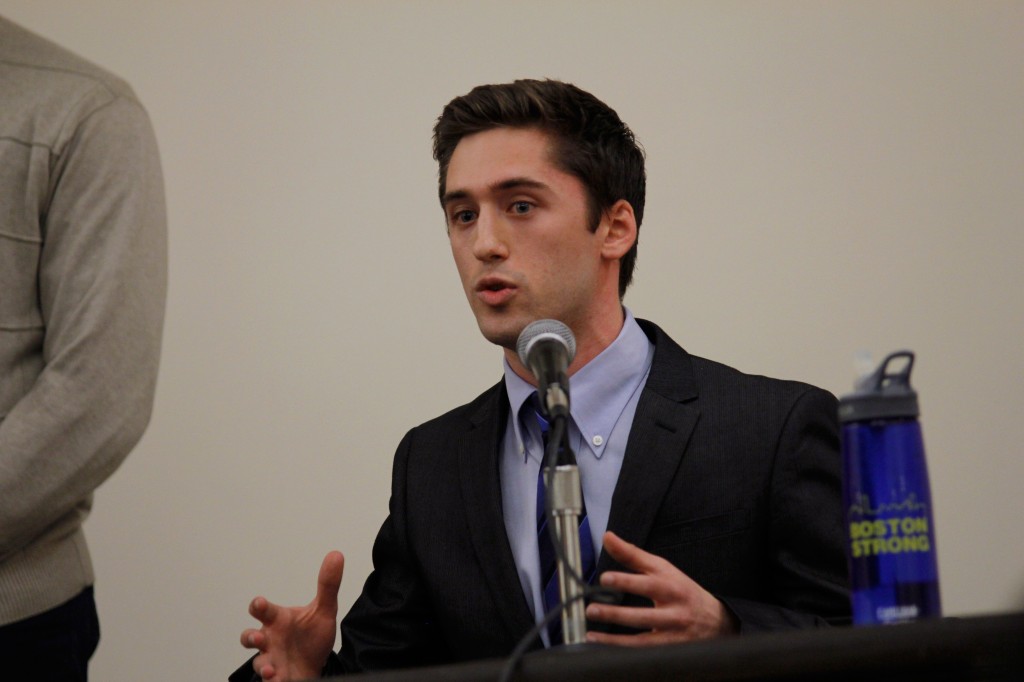
In one of their last opportunities to present to campus, the 2015-2016 SA E-Board candidates faced off in a debate and sweeps in the Mandela Room.
Due to Tuesday’s storm, sweeps were pushed back a day. The dual event allowed the candidates to present their platforms and then answer questions related to their positions. The debate was hosted by the Caribbean Student Association (CSA), the Black Student Union (BSU) and the Latin American Student Union (LASU).
Sweeps were hosted by the Planning, Research and Elections Committee (PRE) and were open to members of all the dorm communities and Off Campus College Council (OC3).
Debate questions ranged from asking vice president for programming candidates to address the current budget deficit in the office to requesting executive vice president candidates to expand on B-Engaged.
Vice president for finance candidates Kate Tashman and Michael Sabony addressed the budget and reimbursement process. Sabony, a junior double-majoring in accounting and history, said that to increase efficiency, the office needs to stay organized and make the process easier for students.
Tashman, a sophomore double-majoring in biomedical engineering and mathematics, said that she intends to better explain the process to student groups.
“The way that I would like to attack having less rejections is by going over what student groups get wrong the most at the beginning of the year,” she said. “I see the same mistakes every single day, so if we can address how to fix that the process would be a lot better.”
Presidential candidates were pressed in both events about the ways that they will be accessible to students. While both candidates said they prioritized accessibility, each candidate had his own idea of how to be most effectively available.
“Accessibility for me isn’t where I will set up meetings,” said Max Bartell, a junior double-majoring in political science and philosophy, politics and law. “If I run into you in the hallways and we chat for five minutes, that’s accessibility.”
Dillon Schade, a junior majoring in industrial and systems engineering, said that he would utilize the SA office when reaching out to the students.
“With a diverse campus and over 290 student groups, I want the SA office, and the president’s office specifically, to be a place where everyone is welcome,” Schade said. “And afterwards, I will present the student body efficiently to the administration.”
Housing communities voiced concern about possible budget cuts. Bartell said he had not been in any of the SA budgetary meetings, but would have opposed the budget cuts. Schade proposed an alternative method of raising funds.
“For every hour of volunteer service you get approved by the CCE, we will give you x number of dollars,” Schade said. “This will be huge for communities as a whole. You guys can raise money, and not spend your own personal funds.”
Epiphany Munoz, a sophomore double-majoring in sociology and Africana studies and the only candidate for vice president for multicultural affairs, was asked to expand on Pipe Dream’s non-endorsement during the debate and in sweeps. She said that because of her recent work with Students for Change, she had put the campaign on the back burner. But since then, said she has had time to reflect on her campaign and finalize a direction.
“I think the fact that I am the only person running for this position is a problem, so I want to increase visibility for this position,” Munoz said. “The entire office should be a beacon of accountability for racism or gender oppression issues that go on on campus.”
Munoz also said that she intends to expand Harpur’s Ferry, and would prioritize diversity in the hiring process for the program, which is currently a merit-based system.
“If you’re just focusing on merit, you’re disregarding a whole realm of experiences that have merit on their own,” Munoz said. “I don’t think it would necessarily be sacrificing merit, since it’s important to have diversity.”
In both events, many of the candidates were questioned about diversity and issues of discrimination on campus. The vice president for academic affairs candidates were asked to reflect on their own personal levels of cultural competency.
Amanda Baker, a junior double-majoring in history and mathematics and a VPAA candidate, said she considered herself culturally competent, but that there was always room for growth. Robert Pim, a junior double-majoring in finance and management and a VPAA candidate, addressed a need to build relationships with student groups and the administration to help create policies increasing cultural awareness on campus.
“I’m not nearly as competent as I should be, and I don’t believe that anybody is as competent with cultural understanding as they could be,” said Steve Lazickas, a sophomore double-majoring in political science and history and a VPAA candidate. “I believe education is the first step. Educate people on other cultures and other ways of life. If you can build a basis of understanding, then maybe acceptance will follow. As the Student Association, you can’t punish people for not understanding, but you can try to broaden people’s horizons.”


